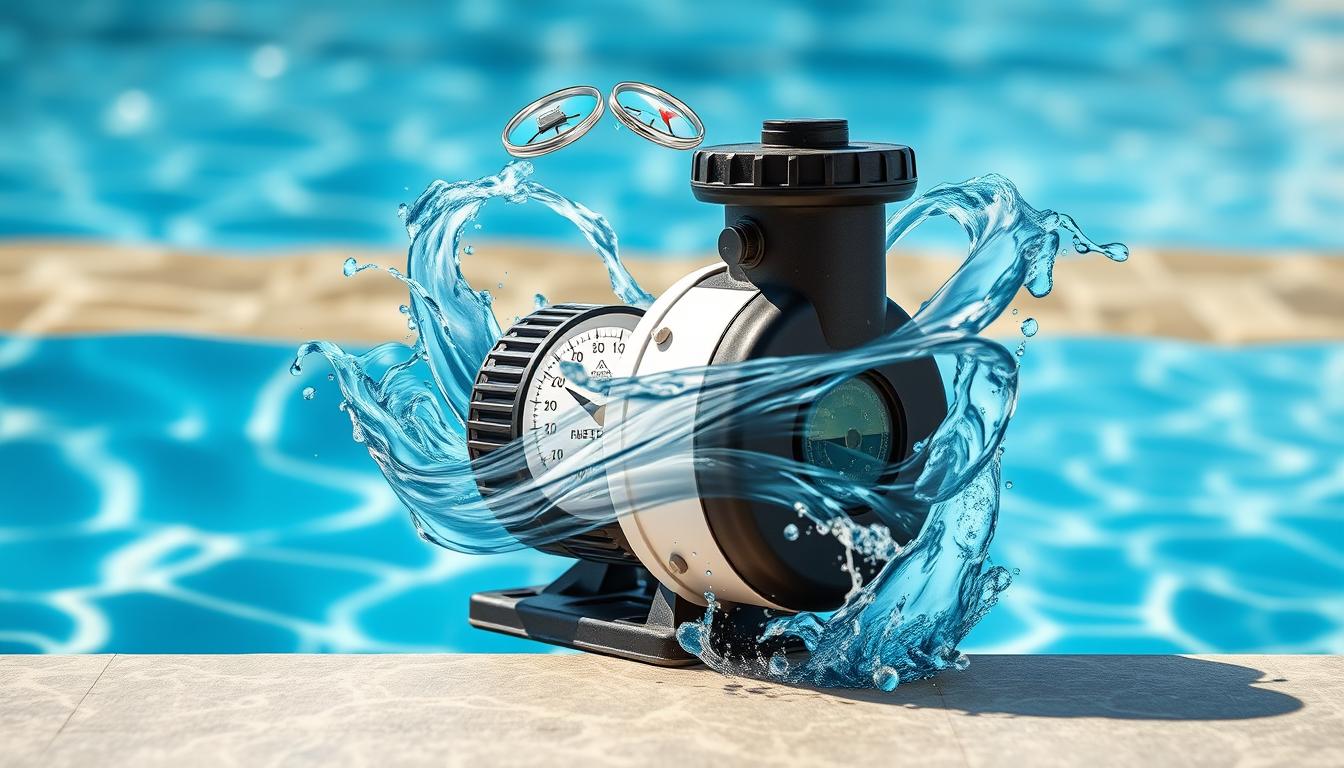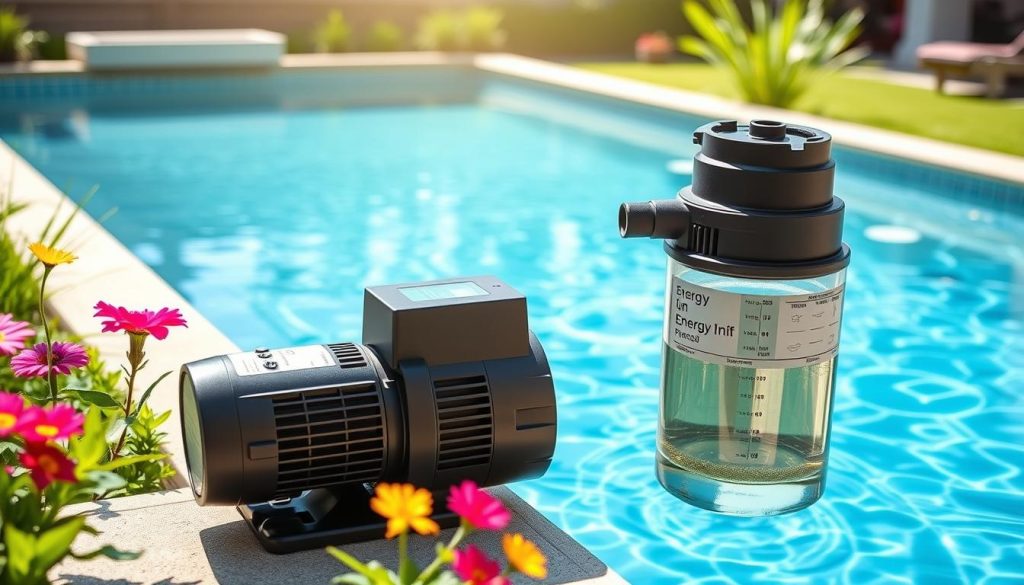
Sarah and Mark are pool owners facing a common summer dilemma. They’re unsure how long to run their pool pump daily. Some suggest 24/7 operation for clear water, while others warn of high energy costs.
The couple researches to find a balance between maintenance and cost-effectiveness. They aim to make an informed decision about continuous pool pump operation.
Your pool pump is crucial for maintaining clean, inviting water. It’s the heart of the pool’s circulation system. The decision to run it non-stop or strategically can greatly affect your pool and budget.
Let’s explore the pros and cons of running your pool pump 24/7. This information will help you choose the best approach for your pool needs.
Understanding Pool Pump Operation
Pool pumps are vital for clean, well-maintained swimming pools. They affect energy use and pool health. By optimizing your pump’s performance, you can save energy and keep your pool crystal-clear.
Efficient pool pumps can cut costs and improve maintenance. Understanding how they work helps you make smart choices for your pool care.
Ideal Running Time for Pool Pumps
Pool pump running time depends on pool size, climate, and usage. In summer, run pumps 8-10 hours daily. For cooler temps, 4-6 hours is enough.
The goal is to find the lowest RPMs that keep your pool clean. Experiment with settings to find the right balance for your pool.
Don’t run variable speed pumps at high RPMs constantly. Use low speeds for regular filtration. Save high speeds for cleaning or powering water features.
Factors Affecting Pool Pump Operation
Several factors influence your pool pump’s optimal operation:
- Pool size: Larger pools require longer running times to ensure proper circulation and filtration.
- Climate: Pools in warmer climates may need longer running times due to increased evaporation and the potential for algae growth.
- Insulation: Well-insulated pools retain heat better, reducing the need for extended pump operation.
- Usage patterns: Frequently used pools may require longer running times to maintain water clarity and chemical balance.
- Pump efficiency: Energy-saving pool pumps, such as variable speed models, can significantly reduce energy consumption while maintaining optimal performance.
Consider using a pool pump timer or automation system. These tools help schedule pump operation during off-peak hours. Some electric companies offer discounted rates for nighttime and weekend use.
Check with your power company to maximize savings. Smart scheduling can lead to significant cost reductions.
With a variable-speed pump, saving 75% or more on your electric bill is achievable by reducing RPMs when not in use.
| Filter Type | Maintenance | Filtration Effectiveness |
|---|---|---|
| Sand Filters | Low | Least effective in trapping small particles |
| Cartridge Filters | Easier than DE filters | Captures more debris than sand filters |
| Diatomaceous Earth (DE) Filters | Difficult | Provides the best filtration |
Understanding pool pump operation can improve efficiency and reduce costs. By using energy-saving strategies, you’ll maintain a clean, inviting pool for your family.
Optimize your pump’s performance to enjoy a sparkling pool while saving money. Smart pool management leads to better experiences and lower bills.
Benefits of Running Your Pool Pump 24/7
Running your pool pump 24/7 can offer several benefits for your pool’s health. It keeps water in constant motion, ensuring optimal circulation, filtration, and chemistry balance. Let’s explore the advantages of round-the-clock pool pump operation.

Consistent Water Circulation and Filtration
Continuous pool pump operation provides consistent water circulation and filtration. This prevents stagnation and allows the filtration system to work more effectively. It removes debris, dirt, and contaminants, keeping your pool cleaner and clearer.
Proper circulation ensures that chemicals are evenly distributed throughout the pool. This maintains a balanced and safe swimming environment for everyone to enjoy.
Improved Pool Chemistry and Clarity
Running your pool pump 24/7 can help stabilize pH levels, alkalinity, and chlorine concentrations. Consistent circulation allows chemicals to work more efficiently, preventing fluctuations that can lead to cloudy water.
A variable speed pool pump can fine-tune the flow rate. This optimizes chemical distribution and maintains crystal-clear water in your pool.
Ideal levels for pool water safety: pH 7.4–7.6, Alkalinity 100–150 ppm, Chlorine 1–3 ppm.
Reduced Algae Growth and Maintenance
Algae thrive in stagnant, poorly circulated water. Running your pool pump around the clock can significantly reduce the risk of algae growth. Constant water movement makes it difficult for algae spores to take hold and multiply.
Proper filtration and balanced chemistry create an environment that is less hospitable to algae. This means you’ll spend less time and money on algae treatments.
| Pump Type | Energy Savings | Ideal Running Time |
|---|---|---|
| Single-speed | – | 6-8 hours |
| Variable speed | Up to 75% | 8-12 hours |
Variable speed pool pumps have a higher upfront cost than single-speed pumps. However, their long-term energy savings and efficiency gains make them a worthwhile investment.
Properly programming your variable speed pump optimizes its performance. Running it at a lower speed for longer periods can minimize maintenance requirements.
Running your pool pump 24/7 improves circulation, filtration, and chemistry balance. It also reduces algae growth. Invest in a high-quality, energy-efficient pool pump for a cleaner, healthier pool.
Drawbacks of Running Your Pool Pump 24/7
Running a pool pump 24/7 has its pros and cons. Let’s look at some challenges of non-stop pump operation.
Increased Energy Consumption and Costs
Constant pump operation can lead to higher energy use and costs. This is true even with energy-saving models. Your utility bills may rise, especially during peak seasons or in high-rate areas.
| Scenario | Flow Rate (GPM) | Running Time (Hours) | Power Consumption (Watts) | Daily Cost |
|---|---|---|---|---|
| 1 | 60 | 12 | 1,600 | $4.80 |
| 2 | 30 | 24 | 200 | $1.20 |
Lower flow rates for longer periods can save money. It’s key to balance 24/7 operation benefits with your budget.
Potential for Increased Wear and Tear on Equipment
Non-stop running can cause more wear on your pool pump. This might lead to more repairs or earlier replacement. High-quality pumps designed for continuous use can help.
Regular upkeep and timely fixes can extend your equipment’s life. Still, weigh full-time use benefits against long-term costs.
Noise Pollution and Disturbance
Round-the-clock pump operation may create unwanted noise. This can bother you and your neighbors. Older or single-speed models can be especially loud.
Variable speed pumps tend to run quieter, as do those housed in acoustic enclosures. When considering 24/7 operation, it’s important to evaluate your pump’s noise level and determine if the non-stop sound is tolerable in your environment.
To reduce noise, try upgrading to a quieter, variable-speed pump. Sound-reducing enclosures can also help. Proper placement and vibration-dampening materials can cut down on noise transfer.
Optimizing Pool Pump Efficiency
Properly sizing your pool pump is key to maximizing efficiency. An oversized pump wastes energy, while an undersized one strains the system. Invest in a well-fitted, energy-saving pump to cut costs without sacrificing performance.
A pool cover helps retain heat and reduces pump running time. Regular cleaning and maintenance ensure optimal performance. These steps extend the pump’s lifespan and boost overall efficiency.
Upgrading to a variable speed pump with smart controls offers top-notch automation. These pumps have higher COP ratings and can be programmed for your pool’s specific needs. While costlier upfront, they provide significant long-term energy savings.
Variable speed models are a smart choice for pool owners focused on efficiency. They offer substantial benefits over time, making them a worthwhile investment. These pumps help create a more sustainable and cost-effective pool system.







